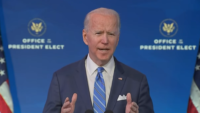Industry groups praised Shuster's introduction of the water-resources bill. American Association of Port Authorities President and CEO Kurt Nagle said his group is studying the measure's details. But he also said in a statement that private-sector companies have been spending more than $9 billion a year on port infrastructure, adding, “Our nation needs the federal government to uphold its end of this partnership by making badly needed investments into improving the land- and water-side connections with seaports.”
Amy Larson, National Waterways Conference president, noted water infrastructure's importance to U.S. global economic competiveness and urged swift approval of the newly introduced House measure.
However, the Shuster and Senate bills have key differences. Shuster says the main point of departure is in how the two measures deal with project authorizations in the current anti-earmark environment on Capitol Hill.
Shuster’s version would authorize 23 new Corps projects that have each received positive reports from the Army’s chief of engineers. That provision is similar to language in the Senate-passed WRDA.
But for future projects, Shuster’s bill would establish a new procedure: State and local agencies would propose projects for possible inclusion in an annual Corps water-resources report to Congress. That report would include detailed data, including expected project benefits and federal and non-federal costs.
Then, using the Corps reports, Congress would set water-project authorization priorities.
Shuster has criticized the Senate project provisions, contending they result in Congress giving up approval authority to the Corps and the White House. Regarding his new bill, Shuster says, “We did not [cede] one inch of our constitutional authority to the executive branch.”
In another difference, the Senate bill includes a $500-million federal loan program for Corps and Environmental Protection Agency projects, called the Water Infrastructure Finance and Innovation Act. But that provision is absent from Shuster’s bill.
Like the Senate-passed bill, Shuster’s measure would accelerate Corps project approval.



Post a comment to this article
Report Abusive Comment